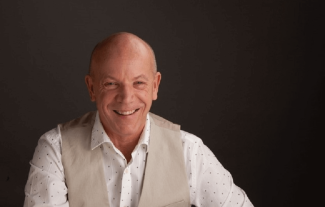Waking up one morning with a stammer — finding out why

When Canada-based Chris Loranger woke up one morning unable to speak, doctors didn't diagnose it as a stammer. That was something he had to find out for himself. Here he talks about his quest for answers and finding people just like him.
When something went horribly wrong with my health, I don't remember wishing to get better. More than anything, I wanted to know what happened and why.
Six years ago, at the age of 68, I awoke one morning as a profoundly different person. I could barely speak and I was experiencing up to twenty non-epileptic seizures a day. A psychiatrist told me the 'software' of my brain wasn't working properly; she rationalised all my symptoms to her diagnosis. The knowledge kept panic and despair at bay. No one ever said the word 'stuttering' to me, though.
I came to that term through a wonderful film on YouTube called Stutterer (watch the trailer). I identified with the protagonist — a man unable to speak. I joined three stuttering organisations and began using the word to explain my speech disorder to my friends. Through the Canadian Stuttering Association (CSA), I joined a support group for people in my province and met others who stuttered.
My psychiatrist is a marvel; I adore her. She provided the understanding essential to my peace of mind. But she did not tell me how to live without speech in a speaking world. That, I had to do alone.
I felt I fit in with the group but as time passed I became aware of a difference between my stutter and those of the other people in my group. Theirs came and went; there were days when they stuttered more and others less. But theirs didn't change like mine did. I was often completely mute and none of them had other symptoms. No one else had seizures or flailed their arms when they spoke, like I did.
Looking for answers
I attended the online CSA annual conference, where I met leading Canadian researchers on stuttering and enrolled on Dr. Gerald Maguire's online lecture. I felt very lucky to be able to talk to him and ask him questions. But I found that I couldn't relate to what they were all saying because the stuttering they spoke about started in childhood. Mine didn't.
My mind was filled with questions but I could find no answers. And then I came upon the term 'late onset stuttering' — stuttering that starts later in life. That gave me a new phenomenon to study, and I discovered the different types: Neurogenic, psychogenic and pharmacogenic stuttering (editor's note: read about these types on our What Causes Stammering? page). Armed with this new information, I talked to my psychiatrist and we agreed that I have a psychogenic stutter. I learned that this arises in adults from psychological factors and is often the result of severe or prolonged emotional trauma. My psychiatrist had, early on, attributed the onset of my various symptoms to childhood abuse. I'd been abandoned by my birth mother, lived in an orphanage that was abusive and suffered through a dreadful 'custodial' adoption.
- Would you like to write an article? Go to Submit Something For The Site
This clarity of understanding came to me in my third year of living with symptoms that severely restricted my life, and it was the result of my own research. My doctors never once mentioned it until I raised it after seeing the film on YouTube.
Most peoples' stutters begin between the ages of two and five and they receive lots of support, from speech & language therapists, parents and teachers. Some suffer dreadfully from bullying by other youngsters, but there is lots of support for them. But from my experience, late-onset stutterers are obligated to take the lead in their care and, as happened to me, self-diagnose our speech disorders.
Adapting
As a Canadian, I benefit from state provided free medical care like the UK's National Health Service. I was not offered any speech or occupational therapy. I was, however, offered psychiatric services that were instrumental in my adjustment. My psychiatrist is a marvel; I adore her. She provided the understanding essential to my peace of mind. But she did not tell me how to live without speech in a speaking world. That, I had to do alone.
I learned to ask friends and neighbours to make difficult phone calls for me, and to take a written note with me when in conversation with my doctors, vets and at the bank, etc. I always carry a letter from my psychiatrist to explain my condition in case of an emergency, and I've come to value the speech generating apps on my iPad with which I can make phone calls. I've worked out all of these adaptive behaviours myself.
Belonging to the STAMMA group is as important to me as seeing my beloved psychiatrist. My doctor and my peers give me wonderful healing knowledge of not being alone. They give me empathetic understanding that's a vital part of the endless task of adaptation.
One day, I saw online that STAMMA were thinking of forming a support group for adults new to stammering, like me, so I emailed them to express my interest and was invited to join. And there, I found my people.
Every single person in the group has a neurological disorder. Every one of us has Functional Neurological Disorder (FND) — problems with the nervous system that aren't put down to any specific physical cause — or Parkinson's. For us, our stutter is one of several symptoms. We all have seizures, ticks, and/or physical disabilities, and many of us are hyper-sensitive to sensory stimulus. Now when people ask about my speech I tell them I have FND.
Belonging to the STAMMA group is as important to me as seeing my beloved psychiatrist. My doctor and my peers give me wonderful healing knowledge of not being alone. They give me empathetic understanding that's a vital part of the endless task of adaptation. We are a small subset of the global community of stutterers. There aren't many of us, but oh how good it feels to be in company with one another.
I'm gratified to have a name, a diagnosis and a support peer group. Our support group is our best medicine.
*Please note, this was Chris's experience and is not necessarily indicative of the support you can expect to receive. See One-to-one Adult Speech & Language Therapy and Adult Stammering Courses for details of the different options.
Our Adults New to Stammering support group meets online every month. If you'd like to join, click on the link for more details. If you stammer but it didn't start in adulthood, see what other support groups you can join on our Communities & Groups page or our Online Events Calendar.

































